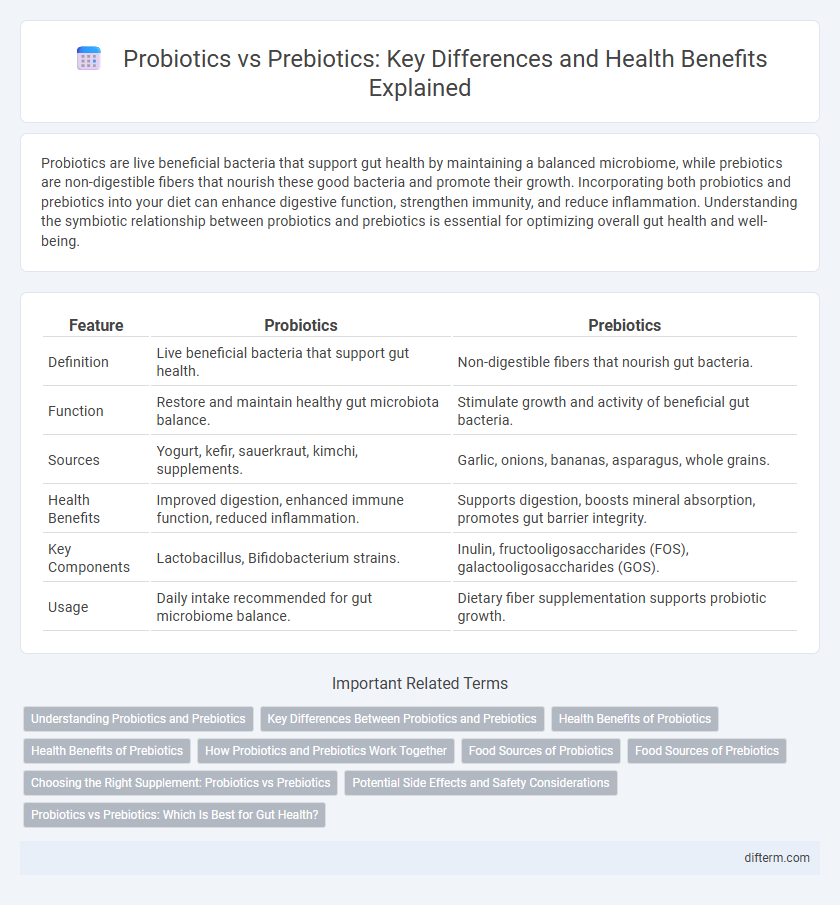Probiotics are live beneficial bacteria that support gut health by maintaining a balanced microbiome, while prebiotics are non-digestible fibers that nourish these good bacteria and promote their growth. Incorporating both probiotics and prebiotics into your diet can enhance digestive function, strengthen immunity, and reduce inflammation. Understanding the symbiotic relationship between probiotics and prebiotics is essential for optimizing overall gut health and well-being.
Table of Comparison
| Feature | Probiotics | Prebiotics |
|---|---|---|
| Definition | Live beneficial bacteria that support gut health. | Non-digestible fibers that nourish gut bacteria. |
| Function | Restore and maintain healthy gut microbiota balance. | Stimulate growth and activity of beneficial gut bacteria. |
| Sources | Yogurt, kefir, sauerkraut, kimchi, supplements. | Garlic, onions, bananas, asparagus, whole grains. |
| Health Benefits | Improved digestion, enhanced immune function, reduced inflammation. | Supports digestion, boosts mineral absorption, promotes gut barrier integrity. |
| Key Components | Lactobacillus, Bifidobacterium strains. | Inulin, fructooligosaccharides (FOS), galactooligosaccharides (GOS). |
| Usage | Daily intake recommended for gut microbiome balance. | Dietary fiber supplementation supports probiotic growth. |
Understanding Probiotics and Prebiotics
Probiotics are live beneficial bacteria that help maintain the natural balance of organisms in the intestines, supporting digestive health and immune function. Prebiotics consist of non-digestible fibers that nourish and stimulate the growth of these beneficial bacteria in the gut. Understanding the complementary roles of probiotics and prebiotics is essential for optimizing gut microbiota and enhancing overall health.
Key Differences Between Probiotics and Prebiotics
Probiotics are live beneficial bacteria that directly enhance gut flora balance and support digestive health, while prebiotics are non-digestible fibers that serve as nourishment for these bacteria, promoting their growth and activity. Probiotics are found in fermented foods like yogurt and kefir, whereas prebiotics are abundant in foods such as garlic, onions, and bananas. Understanding their complementary roles is essential for optimizing gut microbiota and overall immune function.
Health Benefits of Probiotics
Probiotics are live beneficial bacteria that promote digestive health by balancing gut microbiota, enhancing nutrient absorption, and supporting immune function. They help reduce symptoms of irritable bowel syndrome, prevent diarrhea caused by antibiotics, and improve overall gut barrier integrity. Studies link probiotic intake to decreased inflammation and enhanced mental well-being through the gut-brain axis.
Health Benefits of Prebiotics
Prebiotics promote digestive health by selectively nourishing beneficial gut bacteria, enhancing nutrient absorption and immune function. They contribute to reducing inflammation and improving bowel regularity through increased production of short-chain fatty acids like butyrate. Regular intake of prebiotics supports metabolic health and may lower the risk of chronic diseases such as obesity and type 2 diabetes.
How Probiotics and Prebiotics Work Together
Probiotics are beneficial live bacteria that enhance gut health by balancing the microbiome, while prebiotics serve as non-digestible fibers that nourish these bacteria, promoting their growth and activity. Together, probiotics and prebiotics create a symbiotic relationship where prebiotics feed probiotics, improving digestion, immunity, and nutrient absorption. This synergy supports a healthy gut environment, reduces inflammation, and enhances overall wellness.
Food Sources of Probiotics
Fermented foods such as yogurt, kefir, sauerkraut, kimchi, and miso are rich sources of probiotics, containing live beneficial bacteria that support gut health. These probiotic-rich foods enhance digestion, boost the immune system, and help maintain a balanced microbiome. Consuming diverse probiotic foods regularly can improve nutrient absorption and reduce gastrointestinal issues.
Food Sources of Prebiotics
Prebiotics are non-digestible fibers found in foods like garlic, onions, leeks, asparagus, and bananas that feed beneficial gut bacteria, enhancing digestive health. Chicory root and Jerusalem artichoke are among the richest sources, providing inulin, a potent prebiotic fiber. Incorporating these foods into the diet supports the growth of probiotics, improving gut microbiota balance and overall immunity.
Choosing the Right Supplement: Probiotics vs Prebiotics
Choosing the right supplement between probiotics and prebiotics depends on individual gut health needs and digestive goals. Probiotics introduce beneficial live bacteria strains like Lactobacillus and Bifidobacterium to restore balance in the microbiome. Prebiotics, composed of non-digestible fibers such as inulin and fructooligosaccharides, serve as food for these beneficial bacteria, promoting their growth and enhancing gut function.
Potential Side Effects and Safety Considerations
Probiotics, live beneficial bacteria, may cause mild digestive upset such as gas or bloating, particularly in immunocompromised individuals or those with underlying health conditions. Prebiotics, nondigestible fibers that fuel good bacteria, can lead to increased gas, bloating, or abdominal discomfort if consumed in excess. Careful dosage and consultation with healthcare professionals minimize risks and ensure safe incorporation of both probiotics and prebiotics into health routines.
Probiotics vs Prebiotics: Which Is Best for Gut Health?
Probiotics are live beneficial bacteria that directly enhance gut microbiota diversity and support digestive health, while prebiotics are non-digestible fibers that nourish and stimulate the growth of these beneficial bacteria. Studies show that combining probiotics and prebiotics, known as synbiotics, maximizes gut health benefits by improving microbial balance, enhancing immune function, and reducing inflammation. Choosing the best approach depends on individual gut microbiome needs, but synbiotic supplementation often offers superior results compared to probiotics or prebiotics alone.
Probiotics vs Prebiotics Infographic

 difterm.com
difterm.com